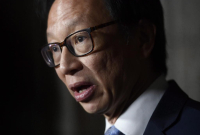‘Troubled’ B.C. premier requests CSIS briefing on alleged Chinese meddling in Vancouver election

VANCOUVER — British Columbia Premier David Eby says he is "very troubled" by allegations of Chinese interference in Vancouver's municipal elections last year and has asked Canada's intelligence agency for a briefing.
Eby said Friday that Canadians deserved a "thorough and independent investigation" into the claims reported in the Globe and Mail newspaper this week that China's consulate in Vancouver meddled in the municipal polls by using diaspora community groups and grooming certain candidates.
The premier said he had asked for a "full briefing" by the Canadian Security Intelligence Service but he had not received it yet.
The newspaper report cites CSIS documents, but Eby said he was not in a position to comment on their credibility.
The report prompted Vancouver Mayor Ken Sim to say on Thursday that he was disgusted by its "insinuations," and he wouldn't be part of the conversation if he was Caucasian.
Eby said the majority of tools to fight international interference were in federal hands, but he needed to know if there was any way for B.C. to "close any gaps."
He said that, for example, Elections BC had already brought forward recommendations to combat misinformation.
"We're always looking for ways to make sure our elections are free and fair," Eby said at a news conference in Prince Rupert in northwest B.C.
This week's newspaper report says the CSIS documents did not name the consulate's favoured Vancouver mayoral and council contenders, but China's diplomats wanted the incumbent Kennedy Stewart to lose.
Sim, Vancouver's first mayor of Chinese descent, defeated Stewart by more than 36,000 votes.
Prime Minister Justin Trudeau decried the impact of the allegations on Sim, saying "little bits and pieces of uncorroborated, unverified information" were being amplified.
Trudeau said Friday that while threats of foreign interference must be taken seriously, Canadians must also be "very, very careful" about such discourse, which could undermine the foundations of democratic institutions.
"The impact on individuals who choose to step forward and serve their communities, like Ken Sim — being attacked by allegations that are incomplete and leaked that he can't even really respond to — is sort of an underscoring of the delicacy of these issues and of how they need to be treated with real seriousness," he said in Guelph, Ont.
Opposition leader Pierre Poilievre, who was visiting Vancouver on Friday, said the latest report indicated that the Canadian intelligence community had lost trust in Trudeau and his ability to deal with possible foreign interference.
"There's an open revolt against the prime minister," Poilievre said of the CSIS leaks. "I think our intelligence community is very worried about what the prime minister is covering up and keeping secret. He's putting his own partisan interest ahead of our national interest."
Poilievre also said Canada's exclusion from alliances such as the Quadrilateral Security Dialogue, between Australia, India, Japan and the United States, indicated Trudeau had also lost the trust of traditional allies.
Margaret McCuaig-Johnston, a senior fellow at the University of Ottawa's Institute for Science, Society and Policy, said there are a number of reasons a foreign government might want to influence municipal politics.
McCuaig-Johnston, an outspoken critic of Beijing, said while municipal governments do not dictate foreign policy, they are central to creating official sister-city relationships.
Those sister-city agreements often involve programs that facilitate cultural and commercial ties between cities, which would then lead to possible "preferential trade and business connections."
There is also the possibility of gaining favour with a municipal politician who then progresses to other levels of government, McCuaig-Johnston said.
"Municipal politicians sometimes move on to … the provincial or federal level," she said. "So it is worth investing effort to establish close, dependent relationships with them early."
This report by The Canadian Press was first published March 17, 2023.





Comments
British Columbia Premier David Eby says he is "very troubled" by allegations of Chinese interference in Vancouver's municipal elections last year and has asked Canada's intelligence agency for a briefing.
Great idea, maybe have them take a look into allegations of dirty energy corporations interfering in our elections also. There are a lot of ex-ministers lobbing for them, as I am sure you are aware and that appears to be a conflict of interest to most British Columbians.